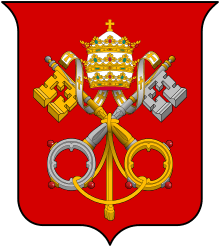Pope Benedict I
| Saint Benedict I | |
|---|---|
 Image of St Benedict | |
| Pope of Rome | |
| Born | Rome |
| Died |
30 July 579 Rome |
| Venerated in | Catholic Church |
| Pope Saint Benedict I | |
|---|---|
 | |
| Papacy began | 2 June 575 |
| Papacy ended | 30 July 579 |
| Predecessor | John III |
| Successor | Pelagius II |
| Personal details | |
| Birth name | Benedictus |
| Born | Rome, Eastern Roman Empire |
| Died |
30 July 579 (aged 54) Rome, Eastern Roman Empire |
| Other popes named Benedict | |
Pope Benedict I (Latin: Benedictus I; d. 30 July 579) was Pope from 2 June 575 to his death in 579.[1]
Life
Benedict was the son of a man named Bonifacius, and was called Bonosus by the Greeks. The ravages of the Lombards rendered it very difficult to communicate with the Byzantine Emperor at Constantinople, who claimed the privilege of confirming the election of the popes. Hence there was a vacancy of nearly eleven months between the death of Pope John III and the arrival of the imperial confirmation of Benedict's election on 2 June 575.[1]
Benedict granted an estate, the Massa Veneris, in the territory of Minturnae, to Abbot Stephen of St. Mark's "near the walls of Spoleto" (St. Gregory I, Ep. ix, 87, I. al. 30). Famine followed the devastating Lombards, and from the few words the Liber Pontificalis has about Benedict, we gather that he died in the midst of his efforts to cope with these difficulties. He was buried in the vestibule of the sacristy of the old Basilica of St. Peter. In a ceremony held in December, he ordained fifteen priests and three deacons and consecrated twenty-one bishops.[1]
Few of the records of transactions outside Rome that could help us understand the history of this Papacy survive from Benedict's reign, and because of the disruptions caused by the Lombards in Italy, perhaps few ever existed.[1]
Popes named Benedict
As of 2017 there have been fifteen Popes named Benedict (not including Benedict X), as well as at least three Antipopes by that name. Some such namings may commemorate this obscure pontiff, but most Popes choosing the name Benedict take their regnal name from Saint Benedict of Nursia (480-543), the founder of the Benedictine monastic movement. In particular, Pope Benedict XVI stated after his election that he was inspired by Pope Benedict XV (in office 1914-1922), who led the Church through the chaos of World War I, and by Saint Benedict of Nursia.[2]
See also
References
- 1 2 3 4

- ↑ "Pope tells why he chose the name of "Benedict XVI", Catholic News Agency
External links

| Catholic Church titles | ||
|---|---|---|
| Preceded by John III |
Pope 575–579 |
Succeeded by Pelagius II |

